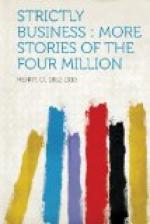“I’ll tell you what you are, Merritt,” said Greenbrier, laying one elbow in his salad and the other in his butter. “You are a concentrated, effete, unconditional, short-sleeved, gotch-eared Miss Sally Walker. God made you perpendicular and suitable to ride straddle and use cuss words in the original. Wherefore you have suffered his handiwork to elapse by removing yourself to New York and putting on little shoes tied with strings, and making faces when you talk. I’ve seen you rope and tie a steer in 42 1/2. If you was to see one now you’d write to the Police Commissioner about it. And these flapdoodle drinks that you inoculate your system with—these little essences of cowslip with acorns in ’em, and paregoric flip—they ain’t anyways in assent with the cordiality of manhood. I hate to see you this way.”
“Well, Mr. Greenbrier,” said Merritt, with apology in his tone, “in a way you are right. Sometimes I do feel like I was being raised on the bottle. But, I tell you, New York is comfortable—comfortable. There’s something about it—the sights and the crowds, and the way it changes every day, and the very air of it that seems to tie a one-mile-long stake rope around a man’s neck, with the other end fastened somewhere about Thirty-fourth Street. I don’t know what it is.”
“God knows,” said Greenbrier sadly, “and I know. The East has gobbled you up. You was venison, and now you’re veal. You put me in mind of a japonica in a window. You’ve been signed, sealed and diskivered. Requiescat in hoc signo. You make me thirsty.”
“A green chartreuse here,” said Merritt to the waiter.
“Whiskey straight,” sighed Greenbrier, “and they’re on you, you renegade of the round-ups.”
“Guilty, with an application for mercy,” said Merritt. “You don’t know how it is, Greenbrier. It’s so comfortable here that—”
“Please loan me your smelling salts,” pleaded Greenbrier. “If I hadn’t seen you once bluff three bluffers from Mazatzal City with an empty gun in Phoenix—”
Greenbrier’s voice died away in pure grief.
“Cigars!” he called harshly to the waiter, to hide his emotion.
“A pack of Turkish cigarettes for mine,” said Merritt.
“They’re on you,” chanted Greenbrier, struggling to conceal his contempt.
At seven they dined in the Where-to-Dine-Well column.
That evening a galaxy had assembled there. Bright shone the lights o’er fair women and br—let it go, anyhow—brave men. The orchestra played charmingly. Hardly had a tip from a diner been placed in its hands by a waiter when it would burst forth into soniferousness. The more beer you contributed to it the more Meyerbeer it gave you. Which is reciprocity.
Merritt put forth exertions on the dinner. Greenbrier was his old friend, and he liked him. He persuaded him to drink a cocktail.
“I take the horehound tea,” said Greenbrier, “for old times’ sake. But I’d prefer whiskey straight. They’re on you.”




